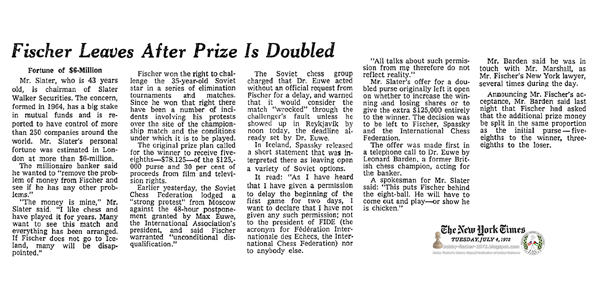New York Times, New York, New York, Tuesday, July 04, 1972 - Page 1-14
Fischer Leaves for Iceland After Briton Adds to Prize by Peter Kihss
A chess-playing London investment banker offered $125,000 yesterday to double the world championship chess purse, and Bobby Fischer, the American challenger, agreed to fly to Iceland to meet Boris Spassky for the title.
Fischer told newsmen at a home in Douglaston, Queens, that while he had not studied the offer by the banker, James D. Slater, in detail, he had decided to go on with the matches because “there's an awful lot of prestige of the country at stake.”
After saying he would probably take a private plane, Fischer made his way with three companions by back roads to Kennedy International Airport. There he transferred to an Icelandic Airlines station wagon and, at 9 P.M., was in effect smuggled aboard an airliner.
The flight, scheduled for 7:30 P.M., took off at 10:04. This would take it into Reykjavik at 7:30 this morning—11:30 A.M. Iceland time and five hours before the start of the rescheduled first game. Fischer had said he would probably be able to play right away, but would see how he felt.
Fischer had a reservation for a flight last week, but ran from the plane at the last moment. When he failed to show up for the start of the 24-game match on Sunday, the International Chess Federation granted a two-day postponement, but warned he would forfeit the match if he did not arrive by noon, Iceland time.
Before Fischer spoke to newsmen—who had been trying for days to find him—Paul G. Marshall, one of his lawyers, said Fischer got word of the Slater offer at 8 A.M. New York time yesterday. It took Fischer about six hours to decide to accept, he said. The 29-year-old American grandmaster reportedly had been seeking 30 per cent of the box-office receipts in addition to a share of the purse raised by the Icelandic Chess Federation.
“Fischer thought the offer was incredible and generous and brave,” Mr. Marshall said, according to The Associated Press.
“His only negative comment,” he added, “was that he felt the English were assuming the Icelandic responsibility.
“The offer was couched in a way he couldn't refuse. It said: ‘If he isn't afraid of Spassky, then I, Jim Slater, have removed the element of money.’ So Bobby felt he had to accept. His pride—he couldn't go down as a coward.”
‘Stupendous Offer’
In New York, Mr. Marshall quoted Fischer as saying in his first reaction, “I've got to accept it—it's a stupendous offer.”
The lawyer insisted that the issue with Mr. Fischer had never been money. “It was the principle,” Mr. Marshall said. “He felt Iceland wasn't treating this match or his countrymen with the dignity that it and they deserved.
“And he was furious about the press censorship. He was flying around the room.”
The reference was to the demand by the Icelandic Chess Federation that newsmen file not more than three dispatches during the progress of each game.
Mr. Marshall quoted the challenger as saying: “They're trying to stop America from reading about it. That's what they've done all along.”
Fischer's own comments came during an interview at the home of Fred M. Saidy, musical-comedy author, at 2 Cedar Lane, Douglaston. The press had been invited by Mr. Saidy's son, Anthony, a physician and a chess master who often competes in international play.
Fischer Appears Nervous
Wearing a blue open-neck long-sleeved double-knit shirt and maroon slacks, the 6-foot-2 chess star carried a leather jacket on his arm, paced about and he seemed nervous.
“We've had these problems with the organizations,” he said. “They've been very petty, but it doesn't pay to be petty like they are.”
Asked if he had had any prodding from the United States Government, Fischer rejoined: “No comment.”
Asked whether the backing and filling, the demands he was reported to have made and the objections he was said to have lodged were an effort to make a psychological impact on his opponent, Fischer replied: “I don't believe in psychology. I believe in good moves.”
He declared that he would have preferred an all-or-nothing prize to the winner of the first 10 games.
Under international rules, the challenger must score 12½ points to win; the titleholder need score only 12 points to retain his title. A victory is worth 1 point and a draw half a point.
Mr. Marshall reported that the Rev. William Lombardy, a Roman Catholic priest and one of 10 United States grandmasters, would go to Reykjavik as Fischer's second.
Col. Edmond Edmundson, executive director of the United States Chess Federation, said the way that the chess purse had been increased by Mr. Slater “means chess at last achieves the place in the sun that many people feel it deserves.”
“Whatever else one may think of Bobby Fischer or his recent actions, he deserves the credit for it,” Colonel Edmundson said.
“He is a chess professional in a country which does not provide Government support for chess players, and he should not be condemned for seeking the maximum private income for his endeavors.”



























